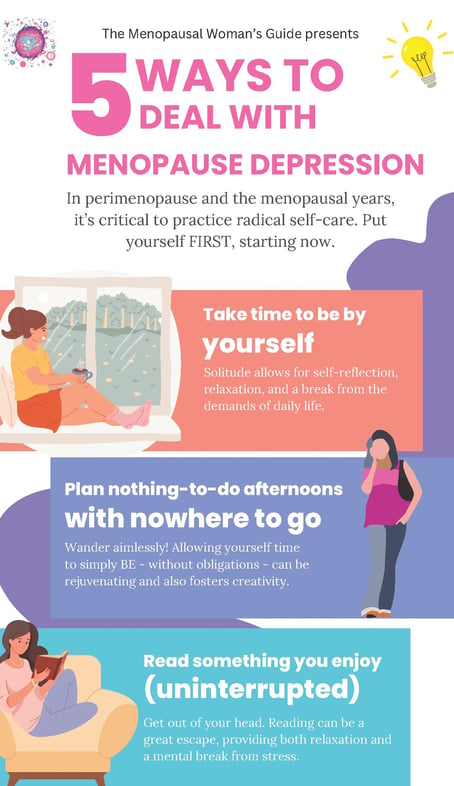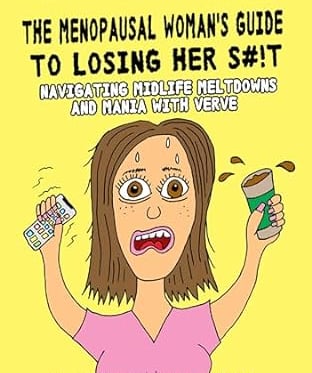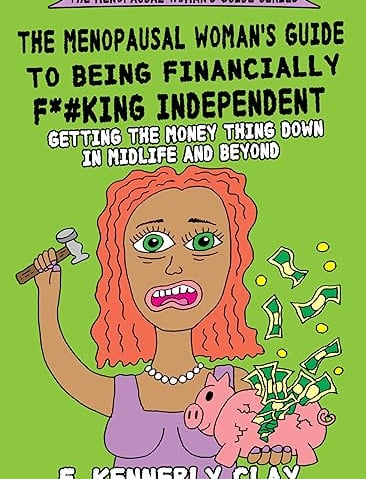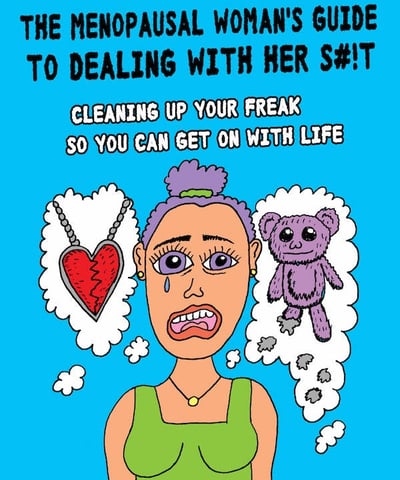
Coping with Menopause Depression
Are you having a tough time coping with menopause depression? We understand. We've been there. Here's wisdom and guidance for how to deal with it.
How to cope when you're depressed in menopause
As if hot flashes, night sweats, and mood swings weren't enough, here comes depression to fuck you up really good. But don’t worry, we’re here to help you find some light in the darkness.
Whether depression gets triggered by life events or physical changes you’re experiencing in menopause - and whether you’ve dealt with depression in the past or not - it’s quite possible it could rear its ugly head in your menopausal years. Menopause and mental health often go hand in hand.
Menopause: The basics
In case you need a refresher, menopause is the stage in a woman’s life when menstrual periods permanently cease, usually between ages 45 and 55. The lead-up to this grand event, known as perimenopause, can start years earlier and is marked by fluctuating hormone levels that throw your body and mind for a loop. Think of it as puberty in reverse, with all the awkwardness but none of the fun.
"With the onset of new tensions, recognizing a problem can lead to understanding its causes and developing new coping mechanisms. Keeping a balance between self, family, friends, and work allows women to meet new challenges and maintain self-confidence." - The North American Menopause Society
Depression in menopause: The sad truth
Depression during menopause isn’t just about feeling a little down. It’s a serious mental health condition that can significantly impact your quality of life. Symptoms may include:
Persistent sadness
Loss of interest in activities
Changes in appetite or weight
Sleep disturbances
Fatigue
Feelings of worthlessness or guilt
Difficulty concentrating
Some people even experience thoughts of death or suicide. Many women even feel like they're having psychotic episodes. If this sounds familiar, know that you’re not alone in this. It's common for women to struggle with depression in menopause - and there is help available.
The hormone connection
Estrogen and progesterone, the dynamic duo of female hormones, play a crucial role in regulating mood. When these hormone levels drop, so do serotonin and dopamine—those feel-good chemicals in your brain. This hormonal upheaval can lead to mood swings, anxiety, and depression.
If you or someone you know is in crisis, please call 988, the Suicide & Crisis Lifeline in the United States.
5 ways to deal with menopause depression
Get the infographic on the importance of self-care in menopause and five creative ways to deal with menopause depression.


Hormonal upheaval
The decline in estrogen and progesterone levels during menopause disrupts the balance of neurotransmitters in your brain, which can lead to mood disorders. It’s like your brain’s thermostat is broken, leaving you emotionally overheated one minute and ice-cold the next.
Life stuff
Menopause often coincides with other significant life changes, such as children leaving home, aging parents, career transitions, and relationship issues. Not to mention, you’re just sick of everybody’s shit and you’re willing to be vocal about it. These stressors can amplify the impact of hormonal changes, creating a perfect storm for depression. At the very least, they can affect your mood and behavior.
The mind-body (dis)connection
The physical symptoms of menopause—hot flashes, night sweats, and insomnia—can take a toll on your mental health. When you're constantly feeling shitty, it's easy for depression to take hold. Poor sleep quality further exacerbates anxiety and depression, creating a vicious cycle that’s hard to break. Some women develop menopause-related health issues like osteoporosis and cardiovascular disease during these transitional years, which can contribute even more to your stress.


Factors contributing to depression in menopause
Menopause often coincides with other significant life changes, such as children leaving home, aging parents, career transitions, and relationship issues. Not to mention, you’re just sick of everybody’s shit and you’re willing to be vocal about it.
Acknowledging your feelings


It’s okay to not be okay
The first step in coping with depression in menopause is acknowledging your feelings. It’s perfectly okay to not be okay. Menopause is a major life transition, and it’s normal to feel overwhelmed. Give yourself permission to feel what you’re feeling without judgment. Sometimes, just admitting that you’re struggling can be a huge relief.
I went through a period of great resistance during perimenopause, essentially damning my experience because I hated what I was feeling. I yearned for my old "self." I couldn't stand that I felt so low energy and fatigued all the time while I used to be such a go-getter. I didn't like being a raging maniac at my children and husband, obliterating the environment with my outbursts. It was tough to be all of these things suddenly. at once yet still keep going. I had to be okay with not being okay (but that doesn't mean I liked).
Breaking the stigma
For some, depression carries a heavy stigma, and women may feel ashamed or embarrassed to admit they’re struggling. Society often expects us to gracefully navigate menopause and everything else in life without making a fuss, but this expectation is both unrealistic and harmful. It’s crucial to break the silence and seek support if you’re experiencing depression. There’s no shame in needing help.
I went through a period of great resistance during perimenopause, essentially damning my experience because I hated what I was feeling. I yearned for my old "self."
Talk therapy
If you’re experiencing symptoms of menopause depression, it’s important to seek professional help. A therapist can help you navigate this challenging time and develop a treatment plan that’s right for you. Cognitive behavioral therapy (CBT) can be particularly effective in helping you change negative thought patterns and develop coping strategies. Get yourself a good therapist to ride out the menopausal wave. Trust me, you'll need one.
Getting on meds
Sometimes, therapy alone isn’t enough, and medication may be necessary to help manage your symptoms. Antidepressants can help restore the balance of neurotransmitters in your brain, making it easier to cope with depression. It’s important to discuss your options with a healthcare provider to find the right medication and dosage for you. Do not be afraid to be medicated! Sometimes our hormonal brains needs some serious fucking tweaking - and fast. I’d rather run for the Prozac than for the suicide fantasies I was having before I got treated for depression.


social media post i made a few years ago
HRT could do the trick
Hormone replacement therapy (HRT) can be a game-changer for some women experiencing depression during menopause. By restoring hormone levels, HRT can help alleviate both physical and mental symptoms. There's also bio-identical hormone replacement therapy (BHRT), my personal favorite, which helped me with life-wrecking fatigue, lack of motivation and brain fog so thick I couldn't see (or think) straight. Talk with a trusted healthcare provider and be sure to do your own research to come to your own conclusions about hormone therapy options that might work for you.
Seeking professional help
Lifestyle changes for coping with the 'change'
Exercise, the natural antidepressant
Exercise is like a magic pill for mental health. Physical activity releases endorphins, the feel-good hormones that can combat anxiety and depression. Whether it’s a brisk walk, a dance class, or lifting weights, moving your body can help clear the mental fog and lift your spirits. Plus, it’s a great way to channel any frustration. Okay, maybe rage. You can channel all that fucking rage when you go for a walk or do something you love. I prefer Pilates, which allows me to lie my lazy ass down on a piece of equipment or the floor and do some low-intensity stretching exercises that help my core get strong and don't require any sweating. I also love to dance so dance parties in my living room are the norm. Find your own groove and do it - as an act of self-love, not as an oh-god-I-have-to-exercise thing.
Feeding for your brain
What you eat can significantly impact your mood and mental clarity. A diet rich in fruits, vegetables, whole grains, lean proteins, and healthy fats can provide the nutrients your brain needs to function optimally. Omega-3 fatty acids, found in fish, flaxseeds, and walnuts, are particularly beneficial for brain health. And while it might be tempting to dive into comfort foods, a balanced diet will serve you better in the long run. Blahblahblah - blahdeeblahblah! Who doesn't know that a healthy diet is good for our brains and bodies? And if we're gaining weight every day in menopause, of course logic tells us to cut back on eating.
Hunger in menopause
My experience? I have been hungry as a mofo in menopause. So when I read things like eat well yet cut back and exercise more, I wondered how on earth I was supposed to do that in my manic state of hell on earth. So I sought out a weight loss MD who helped me with medical weight loss (e.g., Wegovy, Ozempic) and provided clinical nutritional support and coaching. While these options are not for everyone, I can attest that semaglitude injections helped me lose 40+ pounds, which made me feel like a swimsuit model. It was one fucking thing off the menopausal plate: feeling fat and miserable all the time! Again, do your research, and seek out recommendations for a reputable weight management doctor in your area.
I've grown more comfortable with the 3:30 am wake-up...I go pee. I reposition my eye mask and headphones. I put on a podcast. (Alright, alright, I follow no good advice. I listen to true crime podcasts and those narrators put me back to sleep in two minutes.) Plus, the headphones block the noise of my snoring spouse.
Sleep in menopause (sanity at stake)
Good sleep hygiene is crucial for maintaining mental health during menopause. Create a relaxing bedtime routine, keep your bedroom cool and dark, and avoid screens before bed. If night sweats and insomnia are keeping you up, talk to your healthcare provider about potential solutions. Quality sleep can help you manage stress and keep your mood stable.
In fact, you might find it helpful to spend more time in your bedroom, sequestered away from the world, a sanctuary that helps you rejuvenate - at any hour of the day. The more I've gotten into menopause, the more comfortable I've gotten with the 3:30 am wake-up (I call it the witching hour). It goes something like this:
I come fully alert and awake at 3:30 a.m.
I have to pee.
My husband is snoring loudly next to me.
My eye mask is wrapped around my boobs somehow.
My phone has 20 percent power left (which might get me to morning wake-up).
So I go pee. I reposition my eye mask and headphones. I put on a podcast. (Alright, alright, I follow no good advice. I listen to true crime podcasts and I swear those narrators put me back to sleep in two minutes.) Plus, the headphones help block the noise of my snoring spouse. I generally make it another hour or two before waking up, repeating, and waking again.
Remarkably, I am able to feel about the same every day now, regardless of less sleep. But in the early perimenopausal years, when extreme fatigue was my constant companion, loss of sleep felt like such a rip-off. Looking back at it now, I realize that managing the fatigue with BHRT is what helped me feel better during the day, in spite of loss of sleep.
Menopausal mindfulness and relaxation techniques
Mindfulness and relaxation techniques, such as meditation, deep breathing exercises, and yoga, can help you manage stress and stay grounded. These practices can help you become more aware of your thoughts and feelings, allowing you to respond to them in a more balanced way. Apps like Insight Timer, Headspace and Calm offer guided meditations that can fit into even the busiest schedules. I practice the lazy girl's meditation, which allows me to stay in bed a little longer with a 10-minute morning session - done horizontally.
Self-care (totally not selfish)
Self-care isn’t just a trendy buzzword; it’s a vital component of managing mental health during menopause. Engage in activities that bring you joy and relaxation. Whether it’s taking a bubble bath, reading a good book, or gardening, make time for yourself. Your mental health is just as important as your physical health, so don’t neglect it. Put yourself first, effective immediately.
Building a support network
Confiding in friends and family
Having a strong support network can make a world of difference when dealing with depression in menopause. Friends and family can provide a safe space to share your experiences and feel understood. Surround yourself with people who lift you up and can offer empathy and encouragement.
Finding your tribe with support groups
Support groups can be incredibly helpful in navigating menopause and depression. Whether online or in-person, these groups provide a community of women who are going through similar experiences. Sharing your struggles and hearing others’ stories can be validating and empowering. Plus, you might pick up some useful tips and advice along the way.
Getting professional help
In addition to therapy, there are other professional resources available to help you cope with depression in menopause. Your healthcare provider can offer guidance on managing symptoms, and you might benefit from working with a nutritionist, personal trainer, or wellness coach. Sometimes these services are offered or included through medical weight management doctors and may even be covered by your insurance. Find out.
There are also menopause coaches these days - women who've been through it and are specially certified to support women with symptoms to better cope during this transition. Don’t hesitate to seek out the support you need.
Strategies for coping with menopause depression
Find your passion
Rediscovering old hobbies or finding new ones can provide a sense of purpose and fulfillment during menopause. Whether it’s painting, cooking, hiking, or knitting, find something that sparks joy and makes you feel alive. Engaging in activities you’re passionate about can help distract you from negative thoughts and boost your mood.
I found my passion in ikebana, the Japanese art of flower arranging. I took lessons with a local sensei and started to understand and appreciate the quiet between the stems I was arranging. And I was desperate for calm and quiet so flowers really spoke to me, while also infusing my life and home with beauty.
Laugh it off
Laughter truly is the best medicine. Find humor in the little things and don’t take yourself too seriously. Watch stand-up comedy for laugh out loud, feel-good release of endorphins. Read a humorous book, or spend time with friends who make you laugh. Laughter can help reduce stress, improve your mood, and remind you that life isn’t all doom and gloom.
Write your heart out
Writing can be a powerful tool for processing emotions and gaining clarity. Keep a journal to document your thoughts and feelings. Writing about your experiences can help you make sense of them and identify patterns or triggers. Plus, it’s a great way to release pent-up emotions and gain a sense of control over your mental health.
Practice gratitude
Gratitude is a powerful antidote to depression. Taking time each day to reflect on the things you’re grateful for can help shift your focus from what’s wrong to what’s right in your life. Keep a gratitude journal and write down three things you’re thankful for each day. This simple practice can help you cultivate a more positive outlook. Try just saying one thing you’re thankful for the moment you arise from bed in the morning. That’s it. Just one little thing to put some gratitude in your heart.
Volunteer and give back
Helping others can provide a sense of purpose and fulfillment. Volunteering your time and skills can boost your self-esteem and provide a distraction from your own struggles. Plus, knowing you’ve made a difference in someone else’s life can be incredibly rewarding. You might even explore causes that you’re passionate about and start your own community initiative. During perimenopause, I started a social media page and website promoting awareness of wildlife-vehicle collisions on roads. It’s a small way to contribute to a conversation I care about.
Menopause is temporary. The kind of depression you’re experiencing may also let up after all this bullshit is over.
Living well with depression in menopause
Accept it vs. resist it
Accepting that menopause is a natural part of life can help you make peace with the changes you’re experiencing. This doesn’t mean resigning yourself to misery, but rather "being with" the transition and finding ways to navigate it with grace and resilience. Acceptance can be empowering and liberating, allowing you to focus on what you can control.
Don’t get me wrong: Depression in menopause sucks big ones. And accepting with grace is not something I’ve often been able to do. (How do we become accepting of something that’s so difficult in the moment?) At the same time, understanding the correlation between menopause and depression can be empowering. And consider this: Menopause is temporary. The kind of depression you’re experiencing may also let up after all this bullshit is over.
Educate yourself
Knowledge is power. Educate yourself about menopause and mental health so you can better understand what you’re going through. Read books, attend workshops, and talk to your healthcare provider. The more you know, the better equipped you’ll be to manage your symptoms and advocate for yourself.
Stay connected
Isolation can exacerbate mental health issues, so it’s important to stay connected with others. Make an effort to maintain your social connections, even when it's the last fucking thing you feel like doing. And trust me: You probably won’t feel like it. Talking to anyone, or talking about your “stuff” might feel like a useless effort. Nonetheless, make a point of reaching out to friends and family, join support groups, and engage in social activities. Human connection is a powerful antidote to loneliness and can provide a much-needed sense of belonging.
Set realistic goals
Setting realistic goals can help you maintain a sense of purpose and achievement. Break larger tasks into smaller, manageable steps and celebrate your progress along the way. Don’t be too hard on yourself if you don’t accomplish everything on your list. Focus on what you have achieved and keep moving forward.
While you’re at it, cut way back on shit that overwhelms you. I used to be the alpha female, doing it all, running businesses and multiple projects and tap dancing across the universe. When perimenopause hit, I knew I couldn’t keep doing all those things. I was too fucking exhausted and I couldn’t focus to save my life. So I cut back. I started saying no to just about everything - even if it sounded fun to get involved in. I focused on one or two things that were important to me and put my energies there.
Be kind to yourself
Above all, be kind to yourself. Menopause is a challenging time, and it’s important to treat yourself with compassion and understanding. Give yourself grace when things don’t go as planned and celebrate your victories, no matter how small. Remember, you’re doing the best you can, and that’s enough. Actually, sometimes it’s not enough - and that’s okay, too.
On the journey (like it or not)
Coping with depression in menopause is a bitch, but with the right tools and support, you can navigate this challenging time with resilience and grace. Acknowledge your feelings, seek professional help, make lifestyle changes, and build a strong support network.
It may be small consolation but generations of women have walked this path before you and have come out the other side stronger and wiser. Be at ease with the transition, educate yourself, and take proactive steps to manage your mental health. With the right tools and support, you can conquer depression in menopause and emerge with a renewed sense of purpose and vitality.
Remember: You’re bound to lose your shit, but you’re likely to get it back again at some point.
Books for women who are losing it in menopause
Mental Health
Losing your mind in peri/menopause?
The menopausal woman's guide series
Financial Health
Had enough of financial insanity?
Personal Growth
Triggers? Old stuff kicking up?
Related topics
Explore helpful articles, tips, and advice for women who are losing their shit in menopause.
Community
Stay Connected
© 2024. Eclectic Content, Inc. All rights reserved.






